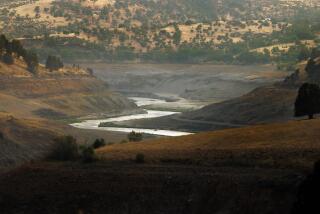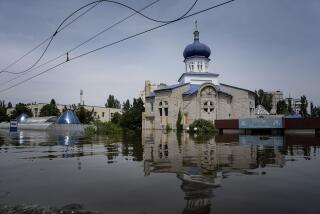Back Into the Rhythm of the Fisherman’s Life
- Share via
FUHUD, Iraq — Khoor Alaa Bedar sat in the bottom of a flat wooden boat and heard the music of water lapping at its sides and his cousin’s blue clothing flapping like a flag cut from pieces of the sky, as they crossed a lake that just a few weeks ago wasn’t there.
A melody of contentment played in his heart. Eleven years of trying to be something he could not were over for Bedar, 30. Every generation in family memory had been fishermen, and trying to eke out a living as a farm worker on a dusty, dried-up plateau had never felt right.
Now he is a fisherman again.
At the end of 1991 and into 1992, the marshes of southeastern Iraq east of Nasiriyah retreated and then disappeared. No one from the regime of Saddam Hussein ever came to tell the fishermen that the government was draining the waters to create farmland and carve a river into the desert. But no one here doubted that it was in retribution for a failed uprising against Hussein.
Like a giant hand that controlled every waterway and even the water that flowed through every tap, the regime used water as a political tool to punish and pressure the people of southern Iraq.
As Hussein’s government fell, it was as if the great dark hand had loosened its grip. The water flowed back to the marshes, and the dribble of a pond surrounded by dry, cracked mud outside the town of Fuhud grew into a magnificent lake.
“We knew Saddam was closing off the water,” Bedar said, “and when he ran away the water came back.”
Theories abound here as to why the water returned, from those such as Bedar who think that Hussein’s disappearance alone was enough to reverse more than 11 years of water engineering to others who believe that the U.S. military opened up dams and dikes as a sign of its power. But they are wrong.
The regime took the water away, and just before it fell, it opened up the dams again. It was a last-ditch military tactic aimed at flooding large areas in the south and creating problems for the U.S. military advance, said Ali Shaheen, the chief of the Irrigation Department in Nasiriyah, about 30 miles west of Fuhud.
The tactic didn’t work. But it brought back hope to the marshland dwellers whose lush green waterways had turned to dusty plains.
Water so defined life for marshland dwellers that the first thing any young man bought when he was old enough and had the money was a flat boat, called masheroof, to pole across the waters.
“It was green. All you saw was green,” said Kadem Madloom, 71, of Fuhud. “The water was pure. In winter, birds from all over the world flew in and you saw them descending from the sky into the water. Then Saddam made everything salty.”
Abdula Mwaniss, 45, started fishing in his late teens. “It was a great life,” he said. “I’d get up at 5 or 6 in the morning. The water was a beautiful blue color. Imagine the crowing of the rooster and the sound of a fox across the water. And then you would hear all kinds of birdcalls everywhere, and frogs. You would see a mist rising over the water.
“Our whole life was the marshes. When they took it away, it was like hell to us.”
Mwaniss and his family are typical of the opponents of Hussein’s Baath Party in this area whom the regime wanted to eliminate by draining the marshes. Mwaniss’ brother Reyad was executed as an army deserter when he was 22. Abdula Mwaniss played a key role in a 1991 uprising against the regime, leading a unit of rebels fighting to topple the Baath Party. He led five rebels, part of a group of 36 fighters, about half of whom were later executed.
When the rebellion collapsed, he escaped into the dense marshlands before the regime unleashed its retribution.
After the uprising, 250 people in Fuhud were arrested and never seen again, including Abdula Mwaniss’ 14-year-old brother-in-law, Hakim Abdul Ghani. After Mwaniss fled, his house was searched and his mother was interrogated and beaten. Security Ministry officials took all the furniture and burned down the house.
Mwaniss remained in the area for 12 years, somehow evading capture. He returned home at the beginning of April, a few days after allied forces attacked southern Iraq and the regime’s end seemed near.
The draining of the marshes more than a decade ago had all the hallmarks of punishment. The farmland created from the damming of the water was poor, and tens of thousands of people left the area. Bird and marine life disappeared, and the ancient culture of the marsh people was savagely undermined.
Shaheen, the Nasiriyah irrigation chief, said the Om Almarek River that was created ran through the desert toward Basra, farther south, but had no useful purpose. The land created was of no importance.
“Many opposition people were in the area, but before the marsh was drained the regime could not get into the marshlands and search the area with tanks and military vehicles,” he said. Shaheen said 400,000 people used to live in the area, most of whom left.
Shaheen said that excess water from the dams in northern Iraq would be directed to the area to help restore the marshlands. But he warned that if there was a shortage in the north, the waters would ebb from the marshes again.
“If the water is high, we’ll release it to the marshes. If there’s not enough water, we’ll have to stop it.”
Ahmed Abdul Hussein, 50, manager of the Department of Agriculture in Abul Khasid, outside Basra, said Saddam Hussein’s regime succeeded in its political aim of scattering its opponents.
“It worked politically,” he said, “because the areas were cleared of trees and there was nowhere for the opponents of the regime to hide.
“Before, the people were herders, bird hunters and fishermen. But they did not make farmers. They knew nothing about it.”
Bedar was among those forced to abandon the fisherman’s life that had long supported their families and remake themselves as farm laborers. He gave up on Fuhud six years ago and, like so many others, left the area.
“There was nothing left for us: no water, no animals, nothing. We returned ... because we heard that the water had come back. Now I am fishing again.”
He never quite felt himself working on the land and never thought that he would improve at it. He feels at one with the gentle rhythm of the fisherman’s life, rising at dawn, bobbing across the water on his boat and patiently casting his net.
“That is our traditional work,” he said. “It’s what I feel I can do. I feel at home on the water.”
More to Read
Sign up for Essential California
The most important California stories and recommendations in your inbox every morning.
You may occasionally receive promotional content from the Los Angeles Times.













